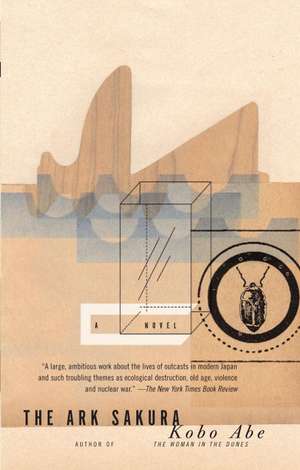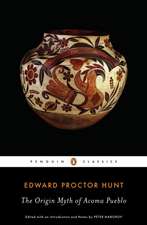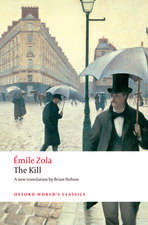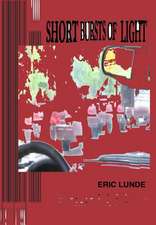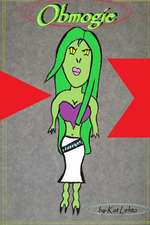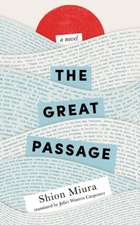The Ark Sakura: Vintage International
Autor Kobo Abe Traducere de Juliet Winters Carpenteren Limba Engleză Paperback – 31 ian 2009
In this Kafkaesque allegorical fantasy, Mole has converted a huge underground quarry into an “ark” capable of surviving the coming nuclear holocaust and is now in search of his crew. He falls victim, however, to the wiles of a con man-cum-insect dealer. In the surreal drama that ensues, the ark is invaded by a gang of youths and a sinister group of elderly people called the Broom Brigade, led by Mole's odious father, while Mole becomes trapped in the ark's central piece of equipment, a giant toilet powerful enough to flush almost anything, including chopped-up humans, out to sea.
| Toate formatele și edițiile | Preț | Express |
|---|---|---|
| Paperback (3) | 48.54 lei 26-32 zile | +18.33 lei 10-14 zile |
| Penguin Books – 2 iun 2021 | 48.54 lei 26-32 zile | +18.33 lei 10-14 zile |
| Penguin Books – 2 noi 2023 | 53.83 lei 26-32 zile | +20.19 lei 10-14 zile |
| Vintage Books USA – 31 ian 2009 | 122.64 lei 3-5 săpt. |
Din seria Vintage International
-
 Preț: 99.89 lei
Preț: 99.89 lei -
 Preț: 126.36 lei
Preț: 126.36 lei -
 Preț: 74.80 lei
Preț: 74.80 lei -
 Preț: 71.87 lei
Preț: 71.87 lei -
 Preț: 67.08 lei
Preț: 67.08 lei -
 Preț: 57.16 lei
Preț: 57.16 lei -
 Preț: 96.31 lei
Preț: 96.31 lei -
 Preț: 68.16 lei
Preț: 68.16 lei -
 Preț: 79.37 lei
Preț: 79.37 lei -
 Preț: 74.37 lei
Preț: 74.37 lei -
 Preț: 81.67 lei
Preț: 81.67 lei -
 Preț: 90.54 lei
Preț: 90.54 lei -
 Preț: 88.86 lei
Preț: 88.86 lei -
 Preț: 109.54 lei
Preț: 109.54 lei -
 Preț: 99.08 lei
Preț: 99.08 lei -
 Preț: 78.38 lei
Preț: 78.38 lei -
 Preț: 107.68 lei
Preț: 107.68 lei -
 Preț: 131.55 lei
Preț: 131.55 lei -
 Preț: 80.58 lei
Preț: 80.58 lei -
 Preț: 120.26 lei
Preț: 120.26 lei -
 Preț: 69.81 lei
Preț: 69.81 lei -
 Preț: 99.82 lei
Preț: 99.82 lei -
 Preț: 118.24 lei
Preț: 118.24 lei -
 Preț: 69.91 lei
Preț: 69.91 lei -
 Preț: 97.34 lei
Preț: 97.34 lei -
 Preț: 93.37 lei
Preț: 93.37 lei -
 Preț: 98.37 lei
Preț: 98.37 lei -
 Preț: 71.62 lei
Preț: 71.62 lei -
 Preț: 119.36 lei
Preț: 119.36 lei -
 Preț: 105.00 lei
Preț: 105.00 lei -
 Preț: 90.95 lei
Preț: 90.95 lei -
 Preț: 77.42 lei
Preț: 77.42 lei -
 Preț: 71.25 lei
Preț: 71.25 lei -
 Preț: 102.92 lei
Preț: 102.92 lei -
 Preț: 133.39 lei
Preț: 133.39 lei -
 Preț: 95.70 lei
Preț: 95.70 lei -
 Preț: 97.57 lei
Preț: 97.57 lei -
 Preț: 71.72 lei
Preț: 71.72 lei -
 Preț: 101.58 lei
Preț: 101.58 lei -
 Preț: 74.47 lei
Preț: 74.47 lei -
 Preț: 81.67 lei
Preț: 81.67 lei -
 Preț: 74.47 lei
Preț: 74.47 lei -
 Preț: 105.63 lei
Preț: 105.63 lei -
 Preț: 74.93 lei
Preț: 74.93 lei -
 Preț: 99.30 lei
Preț: 99.30 lei -
 Preț: 84.32 lei
Preț: 84.32 lei -
 Preț: 90.13 lei
Preț: 90.13 lei -
 Preț: 68.66 lei
Preț: 68.66 lei -
 Preț: 64.61 lei
Preț: 64.61 lei
Preț: 122.64 lei
Nou
Puncte Express: 184
Preț estimativ în valută:
23.47€ • 24.41$ • 19.38£
23.47€ • 24.41$ • 19.38£
Carte disponibilă
Livrare economică 22 martie-05 aprilie
Preluare comenzi: 021 569.72.76
Specificații
ISBN-13: 9780307389633
ISBN-10: 0307389634
Pagini: 333
Dimensiuni: 132 x 201 x 20 mm
Greutate: 0.25 kg
Editura: Vintage Books USA
Seria Vintage International
ISBN-10: 0307389634
Pagini: 333
Dimensiuni: 132 x 201 x 20 mm
Greutate: 0.25 kg
Editura: Vintage Books USA
Seria Vintage International
Notă biografică
Kobo Abe (1924-1993) was one of the most acclaimed Japanese authors of the 20th century. His works include The Woman in the Dunes, Kangaroo Notebook, The Face of Another, The Box Man, The Ruined Map, Secret Rendezous, Inter Ice Age 4, and several others. He was awarded the Tanizaki, Akutagawa, and Yomiuri Prizes.
Extras
1
MY NICKNAME IS PIG--OR MOLE
ONCE a month I go shopping downtown, near the prefectural offices. It takes me the better part of an hour to drive there, but since my purchases include a lot of specialized items--faucet packing, spare blades for power tools, large laminated dry cells, that sort of thing--the local shops won't do. Besides, I'd rather not run into anyone I know. My nickname trails after me like a shadow.
My nickname is Pig--or Mole. I stand five feet eight inches tall, weigh two hundred fifteen pounds, and have round shoulders and stumpy arms and legs. Once, hoping to make myself more inconspicuous, I took to wearing a long black raincoat--but any hope I might have had was swept away when I walked by the new city hall complex on the broad avenue leading up to the station. The city hall building is a black steel frame covered with black glass, like a great black mirror; you have to pass it to get to the train station. With that raincoat on, I looked like a whale calf that had lost its way, or a discarded football, blackened from lying in the trash. Although the distorted reflection of my surroundings was amusing, my own twisted image seemed merely pitiful. Besides, in hot weather the crease in my double chin perspires so much that I break out in a rash; I can't very well cool the underside of my chin against a stone wall the way I can my forehead or the soles of my feet. I even have trouble sleeping. A raincoat is simply out of the question. My reclusion deepens.
If I must have a nickname, let it be Mole, not Pig. Mole is not only the less unappealing of the two but also more fitting: for the last three years or so I've been living underground. Not in a cylindrical cave like a mole's burrow but in a former quarry for architectural stone, with vertical walls and level ceilings and floors. The place is a vast underground complex where thousands of people could live, with over seventy stone rooms piled up every which way, all interconnected by stone stairways and tunnels. In size the rooms range from great halls like indoor stadiums to tiny cubbyholes where they used to take test samples. Of course there are no amenities like piped water or drainage, or power lines. No shops, no police station, no post office. The sole inhabitant is me. And so Mole will do for a name, at least until something better suggests itself.
When I go out I always take along a supply of two items: a key to the quarry entrance and a small card with a map on the back and the words "Boarding Pass--Ticket to Survival" on the front. Late last year I picked up thirty-five leather cases, and put one key and one card in each. I keep three in the pocket of my good pants. If I happen to come across any suitable candidates for my crew, I can invite them aboard on the spot. I've been ready for the last six months now, but the right sort of person has yet to appear.
Preparations for sailing are virtually complete; in fact, all I lack now is the crew. Despite the urgency of the situation, however, I have no intention of conducting any recruiting campaigns. Why should I? In payment for their labors, crew members will receive a gift of incalculable value--the gift of life itself. Were this known, I would be swamped with applicants. Just keeping order would be a problem. Call it an excuse for my retiring ways if you like, but I've always felt that eventually the right people will gravitate to me without my having to go search them out. So you see that whether I have any shopping to do or not, it is essential that I go out once a month or so to mingle with the crowds, come in contact with people, and make my observations.
Ordinarily I use the outdoor parking lot next to the prefectural offices, because the rates are low and it always has plenty of parking space. But today I decided to park underground, beneath the department store across from the station. The notice on a banner hanging from the roof caught my eye:
WONDERS AND CURIOSITIES NEVER SEEN BEFORE!
EXHIBITION AND SPOT SALE OF FAMILY
HEIRLOOMS AND TREASURES
This was obvious hype, but it succeeded in arousing my interest. Also, I wanted a look at the customers. When I entered the store, an announcement was being made to the effect that members of the general public were offering rarities and curios from their private collections for sale at the rooftop bazaar. Evidently I wasn't the only one attracted; almost everyone in the elevator was headed for the roof.
I discovered that the entire rooftop was covered with a maze of some hundred or more stalls. It was like a festival or a fairground; a great tangle of people filled the aisles, some hurrying along, others hesitating in apparent bewilderment. Among the items available were these:
Key chains made of owl talons.
A "bear's ass-scratcher," looking something like dried seaweed. This was apparently a kind of parasitic plant; the seller himself had no idea what to do with it.
A cardboard box filled with assorted springs and cogwheels.
Three sets of horses' teeth.
An old-fashioned inhalator, heated by using an alcohol lamp.
A sharpener for bamboo gramophone needles.
Two whale turds, each a foot in diameter.
Glass nails.
Ointment to rub on the trunk of an elephant with a cold; made in Singapore.
A bloodstained signal flag claimed by its owner to have been used in the Battle of the Japan Sea.
An adjustable ring with plastic ballpoint pen attached.
A sleep-inducing device to plug into your home computer; worn around the ankle, it applied rhythmic stimulation timed to the user's heartbeat.
A jar of sixty-five-year-old shochu, low-class distilled spirits ("Drink at your own risk").
An aluminum-can compressor, utilizing water pressure in accordance with the lever principle.
A privately printed telephone directory purporting to contain "all you need to know" (for residents of Nerima Ward, Tokyo).
3.3 pounds of powdered banana peel (a marijuana substitute?).
A stuffed sewer rat, nineteen inches long.
A baby doll that could suck on a bottle.
And then--the eupcaccla.
Camped somewhere in the heart of the maze was a stall with a display of insect specimens. The stallkeeper must have had in mind schoolchildren with vacation bug-collecting assignments to complete, but his display was devoid of popular items like butterflies and giant beetles. Several dozen little containers about the size of a pack of cigarettes lay heaped in the center of the counter, and that was all. Each was made of transparent acrylic plastic, and each appeared empty. Aluminum foil labels bore the name "Eupcaccia," neatly typed, with the Japanese name in parentheses beneath: tokeimushi--clockbug.
The containers appeared empty only because their contents were so unimposing: what was inside looked like a relative of one of those nameless bugs that crawl through garbage, unnoticed and unloved. The salesman himself cut no great figure. His glasses had lenses like the bottoms of two Coke bottles, and the crown of his head bulged. All in all, a dour-looking fellow. Somewhat to my relief, he had customers to occupy him: a man and a young woman, both sensible-looking types, were turning containers over in their hands and studying them as they listened to the salesman's pitch. I couldn't help pausing to listen in, attracted as much by the authentic ring of "eupcaccia" as by the intriguing nickname, "clockbug."
I learned that in Epichamaic, the language spoken on Epicham Island (the insect's native habitat), eupcaccia is the word for "clock." Half an inch long, the insect is of the order Coleoptera, and has a stubby black body lined with vertical brown stripes. Its only other distinguishing feature is its lack of legs, those appendages having atrophied because the insect has no need to crawl about in search of food. It thrives on a peculiar diet--its own feces. The idea of ingesting one's own waste products for nourishment sounds about as ill-advised as trying to start a fire from ashes; the explanation lies, it seems, in the insect's extremely slow rate of consumption, which allows plenty of time for the replenishment of nutrients by bacterial action. Using its round abdomen as a fulcrum, the eupcaccia pushes itself around counterclockwise with its long, sturdy antennae, eating as it eliminates. As a result, the excrement always lies in a perfect half-circle. It begins ingesting at dawn and ceases at sunset, then sleeps till morning. Since its head always points in the direction of the sun, it also functions as a timepiece.
For a long time, islanders resisted mechanical clocks, deterred by the clockwise rotation, and by what appeared to them the suspiciously simple movements of hands measuring off the passage of time in equal units, without regard for the position of the sun. Even now it seems they refer to mechanical clocks as eupcanu, to distinguish them from "real" clocks--eupcaccia.
There was a charm to the unassuming eupcaccia that went beyond mere practical concerns. Perhaps its almost perfectly closed ecosystem was somehow soothing to troubled hearts. Guests at the Hotel Eupcaccia, the only such facility on Epicham, would come across the insects lying on flagstones (thoughtfully provided by the management) and become riveted to the spot. There were reports of a certain businessman who had sat day after day in the same place, magnifying glass in hand, and finally died raving mad, cheeks bulging with his own excrement. (He seems to have been either a Japanese watch salesman or a Swiss clock manufacturer.) All of this was doubtless more sales talk, but I chose to take it at face value.
The native population, in contrast, showed no such obsession with the insect. Around the start of the rainy season, when tourists went away, the bacterial action so crucial to the well-being of the eupcaccia would fall off, effectively slowing the progress of time. Next came the annual mating season, when time died, as the eupcaccia flew off like clock hands leaving their dials. Then impregnated females criss-crossed clumsily over the ground, fluttering wings as thin as the film on a soap bubble, as they searched for semicircles of dung on which to lay their eggs. The cycle was suspended, time invisible. The clocks shorn of hands were like claw marks on the surface of the ground, lifeless and sinister.
For all this, the islanders have never rejected time itself. The signs of regeneration are always the same.
I couldn't help marveling at the uncanny resemblance that the eupcaccia bore to me. It was as if someone were deliberately making fun of me, yet this insect dealer had no possible way of knowing who I was.
The male customer spoke, after clucking his tongue like someone sucking on a sour plum. "Funny kind of bug," he said. "Looks to me like it's sulking in there." His speech was unpleasantly moist, as if his salivary glands were working overtime. The girl looked up at him and said--her voice dry, the voice of someone sucking on a sugar candy--"Oh, let's get one. They're so cute."
She smiled prettily, dimpling the corners of her naturally red lips. The man stuck out his jaw and produced his wallet with an exaggerated flourish. All at once I decided to buy one too. I felt a strong sense of intimacy with the bug--the sort of feeling aroused by the smell of your own sweat. Fastened with a pin, I would doubtless make just as novel a specimen. Whether the price of twenty thousand yen was high or low I couldn't say, but I had a strange conviction that I had found exactly what I'd been looking for.
The eupcaccia was suspended inside its transparent acrylic container on two fine nylon threads hung at right angles, to make it visible from below as well as above. Without the clear vestiges of atrophied legs, it could have been a dung beetle with the legs torn off.
I paid my money after the couple paid theirs, and watched as the salesman inserted tablets of a drying agent into the top and bottom of the container. Then, slipping it in my pocket, I felt a great easing of tension, like stepping into a pair of comfortable old shoes. "How many does this make?" I asked. "That you've sold today, I mean.
As if the question somehow offended him, the salesman kept his mouth clamped shut. His gaze was refracted in the thick lenses, making his expression hard to read. Was he just ignoring me, or had he not heard? Cheerful background music rose and fell with a passing breeze.
"As soon as I get home I'm going to get out my atlas and see if there really is such a place as Epicham Island," I said, and then laughed. "Just kidding." Still no reaction. Maybe I had gone too far. I hesitated to say anything more.
2
SOMEDAY I'D LIKE TO DESIGN A LOGO BASED ON THE EUPCACCIA, AND USE IT FOR A GROUP FLAG
STRAIGHT back from the entrance was a canvas-roofed rest area that probably doubled as a stage for outdoor concerts. Next to stands selling iced coffee and hamburgers was one selling shaved ice; I ordered a bowlful, flavored with syrupy adzuki beans. Seen though the protective wire-mesh fence, the dusty streets below looked like old torn fishnet. It seemed about to rain: mountains in the distance were swathed in clouds. The noise of thousands of car engines bounced off the sky and merged, interfering with the department-store Muzak in spurts like the gasps of a winded bullfrog.
The bowl of shaved ice and sweet purplish beans chilled my palms. People in the unroofed area were starting to head for the exits, but here nearly every seat was filled. I shared a table with a student (so I judged him to be from the long hair that fell to the nape of his slender neck, and his bloodshot eyes) wearing a dark blue T-shirt with white lettering that read PO PO PO. His face was bent over a bowl of chilled noodles. I crushed the beans in my ice with the back of my spoon, then scooped them up and ate them. The student looked up with a sound of joints cracking in his neck. Evidently he was offended by the critical gaze I had turued on him. It's a bad habit I've developed ever since I started carrying the boarding passes with me. As I go out only once a month, I have to make the most of my time.
"Did you find anything?" I asked.
"Nah." A noodle hung down on his chin; he pushed it into his mouth with a finger and added in a tone of disgust, "What a bunch of junk."
MY NICKNAME IS PIG--OR MOLE
ONCE a month I go shopping downtown, near the prefectural offices. It takes me the better part of an hour to drive there, but since my purchases include a lot of specialized items--faucet packing, spare blades for power tools, large laminated dry cells, that sort of thing--the local shops won't do. Besides, I'd rather not run into anyone I know. My nickname trails after me like a shadow.
My nickname is Pig--or Mole. I stand five feet eight inches tall, weigh two hundred fifteen pounds, and have round shoulders and stumpy arms and legs. Once, hoping to make myself more inconspicuous, I took to wearing a long black raincoat--but any hope I might have had was swept away when I walked by the new city hall complex on the broad avenue leading up to the station. The city hall building is a black steel frame covered with black glass, like a great black mirror; you have to pass it to get to the train station. With that raincoat on, I looked like a whale calf that had lost its way, or a discarded football, blackened from lying in the trash. Although the distorted reflection of my surroundings was amusing, my own twisted image seemed merely pitiful. Besides, in hot weather the crease in my double chin perspires so much that I break out in a rash; I can't very well cool the underside of my chin against a stone wall the way I can my forehead or the soles of my feet. I even have trouble sleeping. A raincoat is simply out of the question. My reclusion deepens.
If I must have a nickname, let it be Mole, not Pig. Mole is not only the less unappealing of the two but also more fitting: for the last three years or so I've been living underground. Not in a cylindrical cave like a mole's burrow but in a former quarry for architectural stone, with vertical walls and level ceilings and floors. The place is a vast underground complex where thousands of people could live, with over seventy stone rooms piled up every which way, all interconnected by stone stairways and tunnels. In size the rooms range from great halls like indoor stadiums to tiny cubbyholes where they used to take test samples. Of course there are no amenities like piped water or drainage, or power lines. No shops, no police station, no post office. The sole inhabitant is me. And so Mole will do for a name, at least until something better suggests itself.
When I go out I always take along a supply of two items: a key to the quarry entrance and a small card with a map on the back and the words "Boarding Pass--Ticket to Survival" on the front. Late last year I picked up thirty-five leather cases, and put one key and one card in each. I keep three in the pocket of my good pants. If I happen to come across any suitable candidates for my crew, I can invite them aboard on the spot. I've been ready for the last six months now, but the right sort of person has yet to appear.
Preparations for sailing are virtually complete; in fact, all I lack now is the crew. Despite the urgency of the situation, however, I have no intention of conducting any recruiting campaigns. Why should I? In payment for their labors, crew members will receive a gift of incalculable value--the gift of life itself. Were this known, I would be swamped with applicants. Just keeping order would be a problem. Call it an excuse for my retiring ways if you like, but I've always felt that eventually the right people will gravitate to me without my having to go search them out. So you see that whether I have any shopping to do or not, it is essential that I go out once a month or so to mingle with the crowds, come in contact with people, and make my observations.
Ordinarily I use the outdoor parking lot next to the prefectural offices, because the rates are low and it always has plenty of parking space. But today I decided to park underground, beneath the department store across from the station. The notice on a banner hanging from the roof caught my eye:
WONDERS AND CURIOSITIES NEVER SEEN BEFORE!
EXHIBITION AND SPOT SALE OF FAMILY
HEIRLOOMS AND TREASURES
This was obvious hype, but it succeeded in arousing my interest. Also, I wanted a look at the customers. When I entered the store, an announcement was being made to the effect that members of the general public were offering rarities and curios from their private collections for sale at the rooftop bazaar. Evidently I wasn't the only one attracted; almost everyone in the elevator was headed for the roof.
I discovered that the entire rooftop was covered with a maze of some hundred or more stalls. It was like a festival or a fairground; a great tangle of people filled the aisles, some hurrying along, others hesitating in apparent bewilderment. Among the items available were these:
Key chains made of owl talons.
A "bear's ass-scratcher," looking something like dried seaweed. This was apparently a kind of parasitic plant; the seller himself had no idea what to do with it.
A cardboard box filled with assorted springs and cogwheels.
Three sets of horses' teeth.
An old-fashioned inhalator, heated by using an alcohol lamp.
A sharpener for bamboo gramophone needles.
Two whale turds, each a foot in diameter.
Glass nails.
Ointment to rub on the trunk of an elephant with a cold; made in Singapore.
A bloodstained signal flag claimed by its owner to have been used in the Battle of the Japan Sea.
An adjustable ring with plastic ballpoint pen attached.
A sleep-inducing device to plug into your home computer; worn around the ankle, it applied rhythmic stimulation timed to the user's heartbeat.
A jar of sixty-five-year-old shochu, low-class distilled spirits ("Drink at your own risk").
An aluminum-can compressor, utilizing water pressure in accordance with the lever principle.
A privately printed telephone directory purporting to contain "all you need to know" (for residents of Nerima Ward, Tokyo).
3.3 pounds of powdered banana peel (a marijuana substitute?).
A stuffed sewer rat, nineteen inches long.
A baby doll that could suck on a bottle.
And then--the eupcaccla.
Camped somewhere in the heart of the maze was a stall with a display of insect specimens. The stallkeeper must have had in mind schoolchildren with vacation bug-collecting assignments to complete, but his display was devoid of popular items like butterflies and giant beetles. Several dozen little containers about the size of a pack of cigarettes lay heaped in the center of the counter, and that was all. Each was made of transparent acrylic plastic, and each appeared empty. Aluminum foil labels bore the name "Eupcaccia," neatly typed, with the Japanese name in parentheses beneath: tokeimushi--clockbug.
The containers appeared empty only because their contents were so unimposing: what was inside looked like a relative of one of those nameless bugs that crawl through garbage, unnoticed and unloved. The salesman himself cut no great figure. His glasses had lenses like the bottoms of two Coke bottles, and the crown of his head bulged. All in all, a dour-looking fellow. Somewhat to my relief, he had customers to occupy him: a man and a young woman, both sensible-looking types, were turning containers over in their hands and studying them as they listened to the salesman's pitch. I couldn't help pausing to listen in, attracted as much by the authentic ring of "eupcaccia" as by the intriguing nickname, "clockbug."
I learned that in Epichamaic, the language spoken on Epicham Island (the insect's native habitat), eupcaccia is the word for "clock." Half an inch long, the insect is of the order Coleoptera, and has a stubby black body lined with vertical brown stripes. Its only other distinguishing feature is its lack of legs, those appendages having atrophied because the insect has no need to crawl about in search of food. It thrives on a peculiar diet--its own feces. The idea of ingesting one's own waste products for nourishment sounds about as ill-advised as trying to start a fire from ashes; the explanation lies, it seems, in the insect's extremely slow rate of consumption, which allows plenty of time for the replenishment of nutrients by bacterial action. Using its round abdomen as a fulcrum, the eupcaccia pushes itself around counterclockwise with its long, sturdy antennae, eating as it eliminates. As a result, the excrement always lies in a perfect half-circle. It begins ingesting at dawn and ceases at sunset, then sleeps till morning. Since its head always points in the direction of the sun, it also functions as a timepiece.
For a long time, islanders resisted mechanical clocks, deterred by the clockwise rotation, and by what appeared to them the suspiciously simple movements of hands measuring off the passage of time in equal units, without regard for the position of the sun. Even now it seems they refer to mechanical clocks as eupcanu, to distinguish them from "real" clocks--eupcaccia.
There was a charm to the unassuming eupcaccia that went beyond mere practical concerns. Perhaps its almost perfectly closed ecosystem was somehow soothing to troubled hearts. Guests at the Hotel Eupcaccia, the only such facility on Epicham, would come across the insects lying on flagstones (thoughtfully provided by the management) and become riveted to the spot. There were reports of a certain businessman who had sat day after day in the same place, magnifying glass in hand, and finally died raving mad, cheeks bulging with his own excrement. (He seems to have been either a Japanese watch salesman or a Swiss clock manufacturer.) All of this was doubtless more sales talk, but I chose to take it at face value.
The native population, in contrast, showed no such obsession with the insect. Around the start of the rainy season, when tourists went away, the bacterial action so crucial to the well-being of the eupcaccia would fall off, effectively slowing the progress of time. Next came the annual mating season, when time died, as the eupcaccia flew off like clock hands leaving their dials. Then impregnated females criss-crossed clumsily over the ground, fluttering wings as thin as the film on a soap bubble, as they searched for semicircles of dung on which to lay their eggs. The cycle was suspended, time invisible. The clocks shorn of hands were like claw marks on the surface of the ground, lifeless and sinister.
For all this, the islanders have never rejected time itself. The signs of regeneration are always the same.
I couldn't help marveling at the uncanny resemblance that the eupcaccia bore to me. It was as if someone were deliberately making fun of me, yet this insect dealer had no possible way of knowing who I was.
The male customer spoke, after clucking his tongue like someone sucking on a sour plum. "Funny kind of bug," he said. "Looks to me like it's sulking in there." His speech was unpleasantly moist, as if his salivary glands were working overtime. The girl looked up at him and said--her voice dry, the voice of someone sucking on a sugar candy--"Oh, let's get one. They're so cute."
She smiled prettily, dimpling the corners of her naturally red lips. The man stuck out his jaw and produced his wallet with an exaggerated flourish. All at once I decided to buy one too. I felt a strong sense of intimacy with the bug--the sort of feeling aroused by the smell of your own sweat. Fastened with a pin, I would doubtless make just as novel a specimen. Whether the price of twenty thousand yen was high or low I couldn't say, but I had a strange conviction that I had found exactly what I'd been looking for.
The eupcaccia was suspended inside its transparent acrylic container on two fine nylon threads hung at right angles, to make it visible from below as well as above. Without the clear vestiges of atrophied legs, it could have been a dung beetle with the legs torn off.
I paid my money after the couple paid theirs, and watched as the salesman inserted tablets of a drying agent into the top and bottom of the container. Then, slipping it in my pocket, I felt a great easing of tension, like stepping into a pair of comfortable old shoes. "How many does this make?" I asked. "That you've sold today, I mean.
As if the question somehow offended him, the salesman kept his mouth clamped shut. His gaze was refracted in the thick lenses, making his expression hard to read. Was he just ignoring me, or had he not heard? Cheerful background music rose and fell with a passing breeze.
"As soon as I get home I'm going to get out my atlas and see if there really is such a place as Epicham Island," I said, and then laughed. "Just kidding." Still no reaction. Maybe I had gone too far. I hesitated to say anything more.
2
SOMEDAY I'D LIKE TO DESIGN A LOGO BASED ON THE EUPCACCIA, AND USE IT FOR A GROUP FLAG
STRAIGHT back from the entrance was a canvas-roofed rest area that probably doubled as a stage for outdoor concerts. Next to stands selling iced coffee and hamburgers was one selling shaved ice; I ordered a bowlful, flavored with syrupy adzuki beans. Seen though the protective wire-mesh fence, the dusty streets below looked like old torn fishnet. It seemed about to rain: mountains in the distance were swathed in clouds. The noise of thousands of car engines bounced off the sky and merged, interfering with the department-store Muzak in spurts like the gasps of a winded bullfrog.
The bowl of shaved ice and sweet purplish beans chilled my palms. People in the unroofed area were starting to head for the exits, but here nearly every seat was filled. I shared a table with a student (so I judged him to be from the long hair that fell to the nape of his slender neck, and his bloodshot eyes) wearing a dark blue T-shirt with white lettering that read PO PO PO. His face was bent over a bowl of chilled noodles. I crushed the beans in my ice with the back of my spoon, then scooped them up and ate them. The student looked up with a sound of joints cracking in his neck. Evidently he was offended by the critical gaze I had turued on him. It's a bad habit I've developed ever since I started carrying the boarding passes with me. As I go out only once a month, I have to make the most of my time.
"Did you find anything?" I asked.
"Nah." A noodle hung down on his chin; he pushed it into his mouth with a finger and added in a tone of disgust, "What a bunch of junk."
Recenzii
“A large, ambitious work about the lives of outcasts in modern Japan and such troubling themes as ecological destruction, old age, violence and nuclear war.”
—The New York Times Book Review
“As is true of Poe and Kafka—two writers whose influence does seem apparent—Abe creates on the page an unexpected impulsion. One continues reading, on and on.”
—The New Yorker
“Abe's depiction of the deadly game of survival is hilarious but at the same time leaves us with a chilling sense of apprehension about the brave new world that awaits us.”
—Los Angeles Times
—The New York Times Book Review
“As is true of Poe and Kafka—two writers whose influence does seem apparent—Abe creates on the page an unexpected impulsion. One continues reading, on and on.”
—The New Yorker
“Abe's depiction of the deadly game of survival is hilarious but at the same time leaves us with a chilling sense of apprehension about the brave new world that awaits us.”
—Los Angeles Times
Descriere
This Kafkaesque novel is an ambitious work about the lives of outcasts in modern Japan and such troubling themes as ecological destruction, old age, violence, and nuclear war ("New York Times Book Review").
